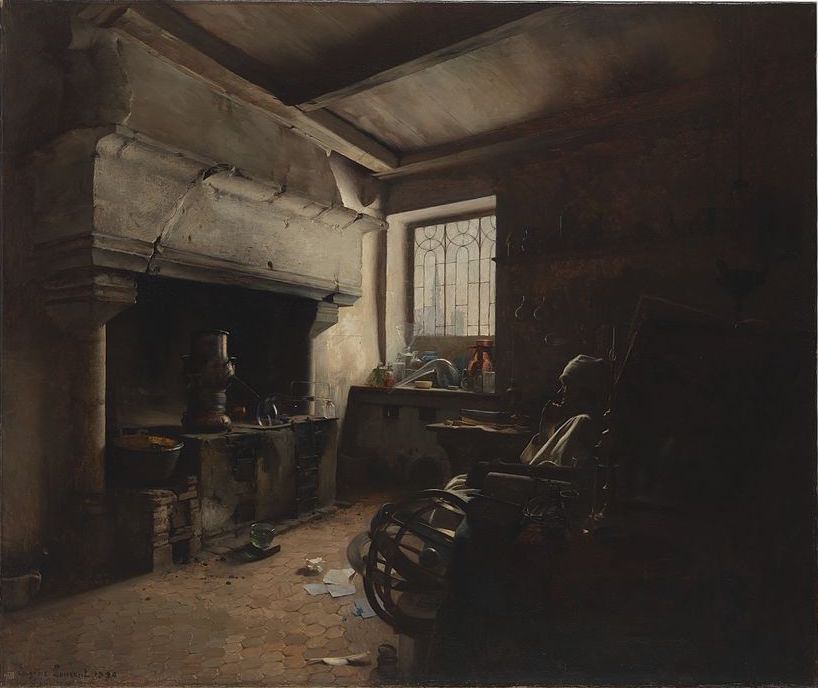【Ejaculate Me So i’m Tired】
Golden Brown
Our Daily Correspondent

E. Lomont, An Alchemist, 1890.
Here’s a phrase you don’t read much nowadays: brown study. First cited in the sixteenth century (specifically in a book called Dice-Play), the expression—which describes a state of intense, sometimes melancholy reverie—really seems to have hit its stride in the nineteenth. Dr. Watson describes “falling into a brown study” in the course of “The Adventure of the Cardboard Box.” In Louisa May Alcott’s Eight Cousins, Uncle Alec “paced up and down the lower hall in the twilight for an hour, thinking so intently that sometimes he frowned, sometimes he smiled, and more than once he stood still in a brown study.” In David Copperfield, Dickens uses it like this: “I fell into a brown study as I walked on, and a voice at my side made me start.” Meanwhile, here’s Conrad, in “Thrift and the Child”:
He ceased and sat solemnly dejected, in a brown study. What day? I asked at last; but he did not hear me apparently. He suffused such portentous gloom into the atmosphere that I lost patience with him.
These were all books written for a popular audience; presumably the phrase was in regular use in both the English and American vernacular. What seems puzzling now would not have to a population who knew brown as a color associated with sadness. Indeed, brown was once used the way we do blue today—to connote melancholy. And it’s a good phrase, well suited to stories sustained by brisk narrative pace; in such cases as these, it was doubtless useful to be able to sketch interiority in a couple of words.
However, there are brown studies and brown studies. In an 1867 volume of The Saturday Review of Politics, Literature, Science and Art, a critic took George Sand to task thus: “Whether it be that the veteran novelist has for once overstrained her powers by a forced and unnatural effort, or that a brown study is a mental attitude wholly foreign to the temperament of Madame Sand, La Reverie a Parisstrikes us as about the dullest and most vapid piece of writing in the book.”
After that, I had to read this abomination—and while it didn’t set the world on fire, I thought the reviewer was a bit harsh. In any event, if this is how private musings were greeted, you can see why a writer of the period might have felt more comfortable sticking to a two-word abstraction—however vague.
Search
Categories
Latest Posts
India's latest ban has Twitter in uproar
2025-06-26 16:52Couple announces pregnancy in a perfect Bob Ross
2025-06-26 16:32Popular Posts
NYT Strands hints, answers for May 18
2025-06-26 18:21All the things 'Parks and Recreation' got right and wrong about 2017
2025-06-26 17:49April Fools' Day pranks to play on your gullible kids
2025-06-26 17:05Norrie vs. Diallo 2025 livestream: Watch Madrid Open for free
2025-06-26 16:55Featured Posts
Musetti vs. Diallo 2025 livestream: Watch Madrid Open for free
2025-06-26 18:27All the things 'Parks and Recreation' got right and wrong about 2017
2025-06-26 17:12Popular Articles
Try not to cry looking at this sad baby monkey hugging a teddy bear
2025-06-26 17:30Bed Bath & Beyond is the latest chain to dump Trump
2025-06-26 17:25Secret commands found in Bluetooth chip used in a billion devices
2025-06-26 16:44Newsletter
Subscribe to our newsletter for the latest updates.
Comments (921)
Vigorous Information Network
'The Last of Us' Season 2, episode 5: The spores are here!
2025-06-26 18:44Habit Information Network
Get schooled online by celebrities like Steve Martin, Shonda Rhimes
2025-06-26 17:47Belief Information Network
15 crayon colors inspired by 2017 that Crayola can have for free
2025-06-26 17:28Exquisite Information Network
Chance the Rapper announces new arts and literature fund for Chicago students
2025-06-26 16:56Passion Information Network
Best headphones deal: Save $116 on Sennheiser Momentum 4
2025-06-26 16:38